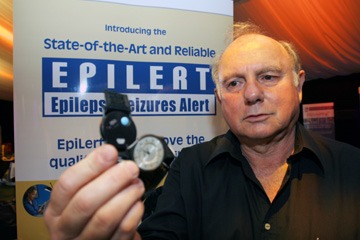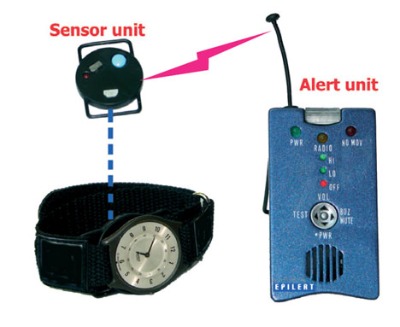The new electronic EpiLert bracelet under development in Israel will signal caregivers when the wearer begins to suffer a dangerous seizure.

Each year, it is estimated that several thousand epilepsy patients in the United States alone will die or suffer severe brain damage from an unattended epileptic seizure.
Epilepsy is an incurable condition that especially affects two vulnerable population groups — young children and people over the age of 65 — and although it can be controlled by medication, seizures are often unpredictable and always frightening.
There is an urgent need for patients to be able to notify caregivers or medical staff about the onset of a seizure. Studies have shown that getting care during a seizure can prevent many more serious problems from occurring. However, someone in the grip of an attack, particularly a child, cannot call for help.
This could all be about to change with the development of a new medical device by an Israeli startup. Known as EpiLert, the device comprises a bracelet that automatically sends an alert signal to caregivers when a person goes into an epileptic seizure.
EpiLert is based on a sensor that can detect the limb movements associated with an epileptic convulsion. The sensor uses a proprietary algorithm developed by a team led by electronics engineer Amos Shaham, co-founder of BioLert, the company developing EpiLert.
No false alarms
“Although there have been many attempts in the past to develop an alert of this kind, the biggest challenge has always been to find a system that could distinguish between ordinary daily movements and those movements unique to an epileptic seizure,” explains Shaham. “Our breakthrough was in devising a technology that produces virtually no false alarms.”

Shaham is working closely with BioLert’s co-founder, Prof. Uri Kramer, director of the Pediatric Epilepsy Service at Sourasky Medical Center in Tel Aviv. “Prof. Kramer was painfully aware of the need for a device of this kind, having treated many patients in his hospital unit and his clinic,” Shaham tells ISRAEL21c.
EpiLert consists of a small sensor (worn on the wrist or ankle) and a remote alert unit. The sensor detects and processes movements and vibrations specific to epileptic seizures, and transmits signals to the remote alert unit. That unit alerts the parent, caregiver or medical assistance service within 20 to 30 seconds of the onset of a seizure. The EpiLert also records essential data of epileptic events for further medical analysis.
BioLert recently completed validation of the technology in a clinical study carried out at the New York University and Sourasky medical centers. The successful results of the study confirm that EpiLert is able to transmit alert signals of epileptic seizures without sending false alarms. Details will be published in the February 2011 edition of the Journal of Clinical Neurophysiology.
An American grant
BioLert recently got an important vote of confidence for its technology when it received a $100,000 grant from a major American epilepsy patient organization, the Washington-based Epilepsy Therapy Project. This funding will enable BioLert to develop an advanced prototype of EpiLert.
The company is looking for additional sources of funding that will allow it to bring the product to the commercialization stage within a year.
“When we received a bit of publicity in the UK several years ago after EpiLert won a prize in a technology contest over there, we were flooded with requests from epilepsy patients and their families. The parents of young children were especially eager to get a hold of such a device,” notes Shaham.
In addition to saving lives and bringing peace of mind to families, Shaham expects the device to bring a promising return to investors. There are about 50 million epilepsy patients worldwide, including about three million in the United States and about six million in Europe..












